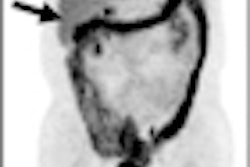Dear AuntMinnie Insider,
What to do with colorectal polyps 6 to 9 mm in diameter -- C-RADS C2 lesions, if you prefer -- is one of the more controversial topics in virtual colonoscopy practice. Because most of these lesions will never grow to reach 1 cm or develop advanced histology, surveillance with low-dose virtual colonoscopy approximately every three years has been proposed for individuals with one or two C-RADS C2 lesions at baseline screening, who have no large polyps that must be removed immediately.
Surveillance is one way to avoid the inconvenience and potential complications of conventional colonoscopy while keeping screening costs down. But will patients go for it?
A new study from Italy found that most patients returned to have the small polyps removed after no more than a year of surveillance. But apparently patients are more, well, patient in the U.S., as most of them are completing their surveillance period without complaint. You'll find a tale of two surveillance cohorts in this issue's Insider Exclusive, brought to you before it's available on our general site.
What's not a cause for concern in virtual colonoscopy is radiation dose. A new study in the American Journal of Roentgenology found that the benefits of screening, even repeat screening at virtual colonoscopy, vastly outweigh the radiation risks. Learn more by clicking here.
Then there's VC's other challenge, flat polyps. Computer-aided detection is getting better at finding them, but detection still lags, according to Belgian virtual colonoscopy expert Dr. Philippe Lefere, who spoke last month at a Society of Gastrointestinal Radiologists symposium in California. For the rest of the story by AuntMinnie.com contributing writer Marty Graham, click here.
Using PET/CT to screen for colorectal cancer? That's what researchers in Taiwan are doing, according to a new study in Radiology. Find out what they learned here.
Meanwhile, reimbursement levels are growing, though not as far or as fast as some would like, according to a recent presentation by virtual colonoscopy luminary Dr. Abraham Dachman.
Finally, don't forget to scroll down for the rest of the stories in your Virtual Colonoscopy Digital Community.




















